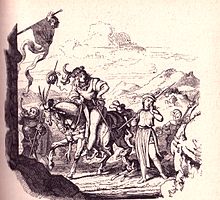Siebenschön (fairy tale)

Siebenschön is a fairy tale . It is in Ludwig Bechstein's German Fairy Tale Book from 1853 on position 39 and comes from Karl Müllenhoff's sagas, fairy tales and songs of the duchies of Schleswig, Holstein and Lauenburg (1845, book 4, no. 4).
content
A poor man lives in a modest hut with his wife and only daughter. Since the couple's daughter is as beautiful as seven young girls together, she is called the seven beautiful. Outside, she wears a veil over her face among her fellow men so that her appearance is not in the foreground for everyone, but rather her inner values. One day the pious girl meets the prince, who immediately falls in love with her and sends a messenger to her with a ring. She should come to the big oak in the evening. Siebenschön, however, believes that the prince would like to order a work from her, and goes to the agreed meeting point. When she found out about the prince's plan that evening, she replied that she was poor and he was rich. In addition, a prince has to marry a princess. The prince emphasizes his feelings again, the girl then asks for time to think. The next day he gives her silver shoes, the next day a gold dress and meets with her at the oak. But Siebenschön still plagues their old concerns. The prince doesn't give up and she finally agrees. The king should not find out about it yet. But an old lady of the court observed the meeting and had a messenger sent to tell the king about his son's appointments. The king then has the hut in which Siebenschön lives with her parents burn down. Siebenschön can save himself by jumping into the fountain next to her hut. Her parents, however, perish in the flames. After the fire has died down, Siebenschön comes out of the well and is devastated. Now that she is on her own, she gets a man's simple clothes and goes to the king's court, where she does services as a servant. If you ask her name, she always answers: "Bad luck". Some time has passed when the wedding with the daughter of the neighboring kingdom is due. The prince accepts his fate because he believes that Siebenschön also perished in the flames at the time. On the wedding day, Siebenschön is right at the back of the wedding procession and sings: "I was called Siebenschön, I now know about misfortune". Then the prince sees the light and realizes that the servant of misery is none other than his great love. He cancels the wedding with the princess of the neighboring kingdom and instead marries Siebenschön.
origin
With Bechstein the text is without comment. Hans-Jörg Uther names the source in Müllenhoff, as a fairy tale type most likely AaTh 884 (woman in men's clothes). The Oedipus conflict about improper marriage is a popular fairy tale theme, it approaches it unrecognized, cf. Bechstein's The Boys with the Golden Stars , Grimm's The Twelve Hunters , The True Bride or Basiles The Garlic Forest .
Siebenschön contains motifs from the French fairy tale Beauty and the Beast and Grimm's fairy tale The singing, jumping little lion .
Film adaptations
- 1982: Märchen der Welt , Germany, episode Siebenschön of the puppet show series, 30 minutes
- 2014: Siebenschön , Germany, fairy tale film from the 7th season of the ARD series Six in One Stroke with Xenia Assenza in the lead role. This first film adaptation of the fairy tale has differences to the original plot. So live u. a. Siebenschön's parents are still and are simply locked up. The role of the nun who helps Siebenschön has been added, as well as that of the baron, who also wants to ask for the hand of Siebenschön and tells the king about the meetings with Siebenschön.
Web links
- Maerchen.net: Bechstein's Siebenschön
- Märchenatlas.de about Siebenschön
- Reading basket: fairy tale text
- Free radio plays: Siebenschön
Individual evidence
- ^ Hans-Jörg Uther (Ed.): Ludwig Bechstein. Storybook. After the edition of 1857, text-critically revised and indexed. Diederichs, Munich 1997, ISBN 3-424-01372-2 , p. 387.
- ↑ Siebenschön at Internet Movie Database , accessed May 4, 2015.